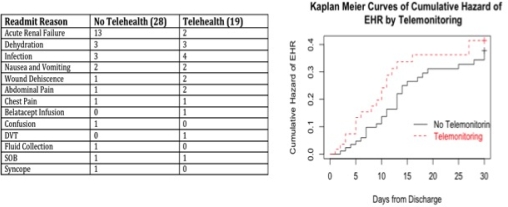Effect of Telehealth Monitoring on Early Hospital Readmission After Renal Transplantation.
1University Hospitals Case Medical Center, Case Western Reserve University, Cleveland, OH
2University of Michigan, Ann Arbor, MI.
Meeting: 2016 American Transplant Congress
Abstract number: C261
Keywords: Kidney transplantation, Post-operative complications
Session Information
Session Name: Poster Session C: Poster Session 1: Kidney Complications-Other
Session Type: Poster Session
Date: Monday, June 13, 2016
Session Time: 6:00pm-7:00pm
 Presentation Time: 6:00pm-7:00pm
Presentation Time: 6:00pm-7:00pm
Location: Halls C&D
Introduction: Early hospital readmission (EHR) is an important quality metric of hospitals' performance. Kidney transplant surgery has a high EHR rate. It is not known if Telemonitoring can have an impact on reducing EHR.
Methods: Our center instituted a Telehealth Kidney Program in 2014, which consists of a one time intensive home visit by a homecare RN (after discharge from hospitalization for kidney transplantation), the installation of the telehealth monitor (Cardiocom), daily monitoring and a daily phone call by a telehealth nurse up to one to two weeks. After vital signs are transmitted daily, a detailed phone call with clinically relevant questions is placed by RN to the patient. All the information is then communicated to physicians involved.
We retrospectively reviewed medical records for EHR (within 30 days of discharge from kidney transplantation) in kidney transplant patients who were in our Telehealth Kidney Program (TKP), and compared to a control group (CG) of kidney transplant patients from 2013. Both the TKP, and CG were matched with age, gender, race, BMI, etiology of ESRD, heart disease, and hypertension status. Chi-Square test, Logistic Regression, and Kaplan-Meier analyses were performed to compare EHR in both groups.
Results: 19 of 57 patients (34%) in the TKP had experienced EHR, compared to 27 out of 67 (32%) patients in the control group. Even though there was 2% increase in EHR in the TKP, there was no statistical significance (p-value=0.86). Odds of EHR in TKP was 12% higher but again without any significance (p-value=0.5). Kaplan-Meier analysis of 30-day EHR free survival also showed similar results. 
Conclusion: EHR after kidney transplantation is high. Even though Telemonitoring was not associated with lower EHR in our study, further studies should be directed at other end points such as patient satisfaction, reduction of medication errors, and other transplant related outcomes.
CITATION INFORMATION: Noon K, Sarabu N, Augustine J, Hricik D, Deleva B, Woodside K, Aeder M, Foote J, Bruno A, Walsh K, Johnston M, Humphreville V, Sanchez E. Effect of Telehealth Monitoring on Early Hospital Readmission After Renal Transplantation. Am J Transplant. 2016;16 (suppl 3).
To cite this abstract in AMA style:
Noon K, Sarabu N, Augustine J, Hricik D, Deleva B, Woodside K, Aeder M, Foote J, Bruno A, Walsh K, Johnston M, Humphreville V, Sanchez E. Effect of Telehealth Monitoring on Early Hospital Readmission After Renal Transplantation. [abstract]. Am J Transplant. 2016; 16 (suppl 3). https://atcmeetingabstracts.com/abstract/effect-of-telehealth-monitoring-on-early-hospital-readmission-after-renal-transplantation/. Accessed March 3, 2026.« Back to 2016 American Transplant Congress
